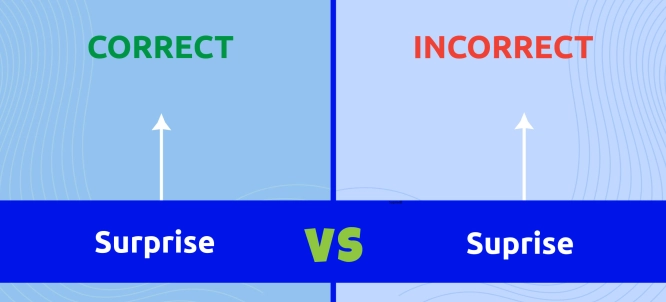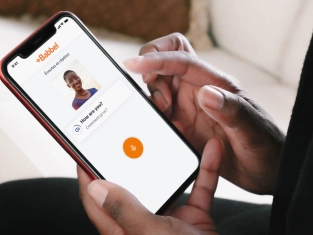by PushtoLearn
Suprise vs Surprise
Table of Contents
Commonly Misspelled Words - Exercises and Quiz
This exercise focuses on commonly misspelled words
What Does "Surprise" Mean?
"Surprise" is the correct spelling of the word. It is both a noun and a verb and is used to describe an unexpected event or the feeling caused by something unexpected.
As a Noun:
Definition: An unexpected event or occurrence.
➡️ "The party was a complete surprise!"
➡️ "She gave me a surprise gift for my birthday."
As a Verb:
Definition: To cause someone to feel amazed or shocked by something unexpected.
➡️"They surprised me with a visit."
➡️ "The magician surprised the audience with his tricks."

What Is "Suprise"?
"Suprise" is a common misspelling of "surprise." It’s incorrect and should be avoided in both writing and speaking. The correct spelling always includes the second "r"—"surprise."
Common Errors
❌ Spelling Mistake:
The most common error is dropping the second "r" in "surprise," leading to the incorrect spelling "suprise."
❌ Pronunciation:
Some people may mistakenly pronounce "surprise" as "suprise," omitting the "r" sound in the middle. The correct pronunciation includes both "r" sounds: /sərˈpraɪz/.
How to Remember the Correct Spelling
⭐ Think of the Word "Rise":
The word "surprise" contains the word "rise" within it. When something surprises you, it can cause your emotions to "rise" suddenly.
⭐ Mnemonic:
Remember that "surprise" has two "r"s—one for the unexpected event and one for your reaction!
Similar misspelling cases include Ninety vs Ninty and Potatoes vs Potatos. Make sure to have a look and get additional practice.
FAQ About Suprise vs Surprise
Why do people often misspell "surprise"?
The second "r" in "surprise" is sometimes missed because it’s not strongly pronounced, leading people to write "suprise."
How can I avoid misspelling "surprise"?
Practice spelling it correctly, and remember the word "rise" is within "surprise," which may help you recall the second "r."
Is "suprise" ever correct?
No, "suprise" is never correct in English. The correct spelling is always "surprise."
What is the correct pronunciation of "surprise"?
The correct pronunciation is /sərˈpraɪz/, with both "r" sounds included.
Can "surprise" be both a noun and a verb?
Yes, "surprise" can be used as both a noun (e.g., "a surprise party") and a verb (e.g., "to surprise someone").

